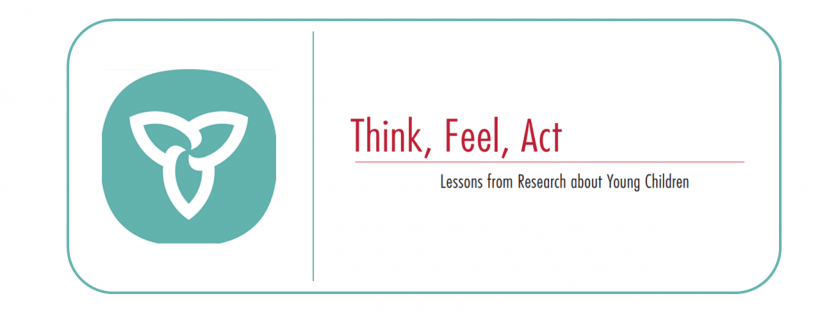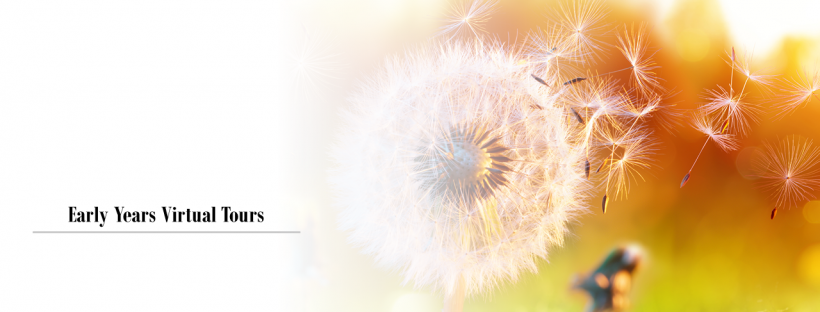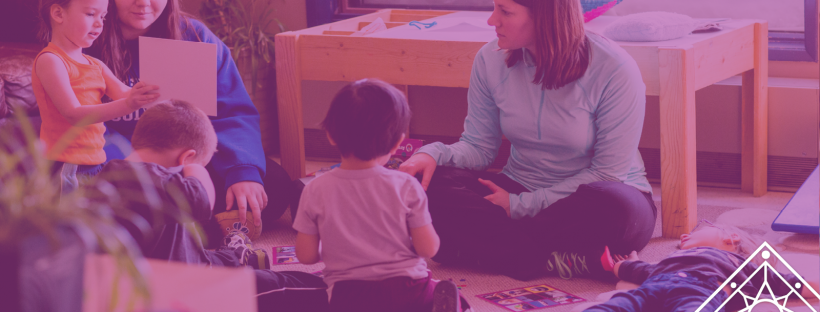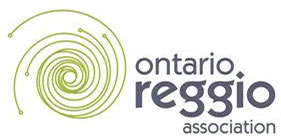In this video, Carol Anne Wien teaches us about pedagogical documentation and how to go from observing children to interpreting their learning. Tell us what you learned through watching this video in the comments below!
Category: Documentation
Virtual tour with Abiinojiishiik-amino-yawook!
On behalf of the Child Care and Early Years team at TBDSSAB we want to say Chi Miigwetch to the incredible team at Abiinojiishiik-amino-yawook EarlyON Child and Family Centre. On Tuesday March 29th Sarah, Jennifer, Sabrina and Erica took us on a journey through their program during our first ever virtual tour gathering! They offered insight into who they are, their journey with embracing and implementing Indigenous culture into their programs and the special ways that make their team unique in our community! Through their insightful video, and the wholesome discussion period, we were able to learn alongside educators within our community and embrace the perspectives they bring to our Early Years field!
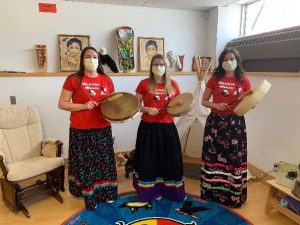
We are looking forward to our upcoming tours which will be happening throughout the Spring and Fall, stay tuned for updates! If you are interested in showcasing your program through a virtual tour, please let us know by emailing early.years@tbdssab.ca!
You can find the RECORDING LINK HERE! Please share your thoughts, reflections and questions in the comment section!😊
Miigwetch and Baamaapii!
REGISTER NOW
We have some exciting events coming up in March!!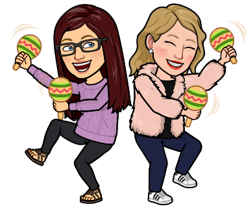
Head on over to the Calendar for details, and REGISTER NOW so you won’t miss a thing!
- Exploring Anti-Racist Pedagogy – March 10 from 1-2pm
- Virtual Tour with Abiinojiishiik-amino-yawook EarlyON Centre – March 29 from 10-11am
Tell Us About Yourself!
Click HERE to complete the form and receive a SUPERSTAR shoutout on the Portal!
Piazza ORA 2022: The role of the teacher
The TBDSSAB pedagogical team will be participating in this year’s Piazza ORA (see information below). We encourage you to reach out to us if you are interested in this opportunity; a group of 5 or more from our community will allow everyone to receive a discounted rate. The focus this year is “Co-researcher, designer, provocateur: The role of the teacher”, more information about the content will be presented soon!
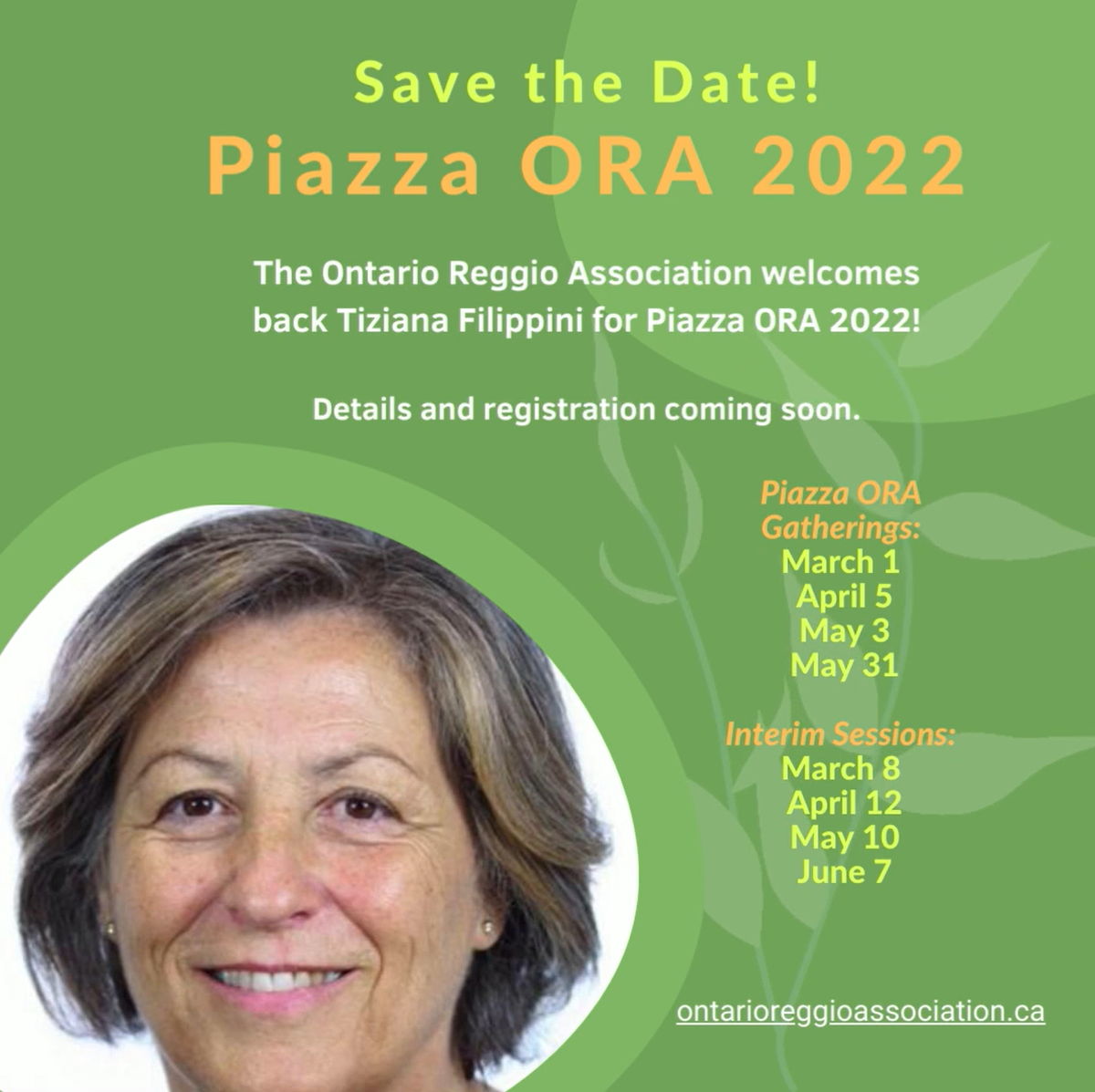
“In response to enthusiastic response from last year’s participants, ORA is providing another extraordinary opportunity to engage with Tiziana Filippini, pedagogista from Reggio Emilia, over the course of four encounters, in Piazza ORA 2022.
Embracing an image of the child that is central to the philosophy that is lived every day in the infant-toddler centres and preschools in Reggio Emilia (and that inspired our provincial pedagogy in Ontario) requires us to also embrace a corresponding image of the educator. This is a teacher who can enter into a kind of intellectual dialogue with a group of children, who will recognize their questions and theories and strategies. Tiziana Filippini wrote “We feel that the teacher must be involved within the child’s exploring procedure, if the teacher wants to understand how to be the organizer and provoker of occasions, on the one hand, and co-actor in discoveries, on the other”. In this, our third Piazza ORA series, we will explore with Tiziana what it means to meet the view of the child to which we aspire, to create contexts for learning that recognize each child’s uniqueness within relationships, keeping in mind what kind of human being and what kind of planet we want.
Active engagement with ideas and translation to practice is essential for deeper understanding, so the series includes interim gatherings with break-out sessions where participants can share how their changing views are affecting what they are noticing, what they are curious about, what they are trying and understanding differently. The practice may be with children or with adults who are working with children. Documentation-in-the-works will be shared among participants to invite other perspectives.
There will be four 2-hour ZOOM gatherings with Tiziana, one per month beginning in early March, a “pre-series gathering” of participants and pedagogical companions to set the stage, and four interim gatherings. We are grateful that again this year, Reggio Children will make a recording of the gatherings with Tiziana available to registrants online for a period of time following the live gathering in order to make it possible for everyone to participate, regardless of work schedule. This makes the series more accessible to everyone. The gatherings with Tiziana take place from 12:30 – 2:30 p.m. and interim gatherings will be scheduled in the evening.
ORA’s mission is to walk with courageous educators who inhabit a place of hope and optimism, who listen and act with intelligence and compassion, and always in relationship with…. We are in dialogue with the educators in Reggio Emilia, and exist to organize opportunities to come together to interrogate our assumptions about children, educators, families, communities, and the places we inhabit, and to recognize and challenge our discourses so we can incline toward the level of joy, creativity, relationship, complexity and engagement that is the “everyday utopia” of Reggio Emilia’s education and cultural project.”
Piazza ORA 2022 Dates
February 22 6:30-7:30 pm (introduction)
March 1 12:30-2:30 pm (gathering with Tiziana)
March 8 6:30-8:00 (interim session)
April 5 12:30-2:30 pm (gathering with Tiziana)
April 12 6:30-8:00 (interim session)
May 3 12:30-2:30 pm (gathering with Tiziana)
May 10 6:30-8:00 (interim session)
May 31 12:30-2:30 pm (gathering with Tiziana)
June 7 6:30-8:00 (interim session)
All participants who are interested in participating in these gatherings will have to be a member of the Ontario Reggio Association which comes at a minimum cost of $50 for the person or organization.
Please click HERE and complete the PD Registration form to express your interest in joining us. The deadline to join the TBDSSAB group is Tuesday, February 1st. If you have any questions, please contact us at early.years@tbdssab.ca.
Celebrating Our Early Years Superstars!
Click HERE to complete the form and receive a SUPERSTAR shoutout on the Portal!
Call Out: Virtual Tours!!Â
We are excited to be collaborating with some of our local service providers to offer Virtual Tours of your early learning spaces. This will be an opportunity for programs to share their strengths and the incredible work that they do for the children and families in our District. We are looking for volunteers who would be interested in giving a tour of their environments, services, or share how you practice Early Childhood Education in your settings.Â
These tours will be less than an hour with some time at the end for questions and conversation. The format of the tour is up to you. For example, we can go live, pre-record videos, create a PowerPoint, present pedagogical documentation, or any other format you can imagine! Â
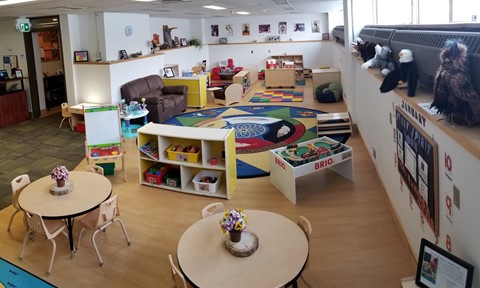
Our hope is to share and celebrate a new location each month. Currently, we are looking to fill spots during the months of May and June… let us know if you are interested by e-mailing us at early.years@tbdssab.ca!  Â
Â
Pedagogical Documentation
We had a wonderful conversation last week about pedagogical documentation. Three educators joined us who each play a different role in our community – one educator in child care, one supervisor of a before and after school program, and one EarlyON coordinator. This diversity of experience made for a unique dialogue and the opportunity to share different perspectives. We all read the article, Curiosity, Curriculum, and Collaboration Entwined: Reflections on Pedagogical Documentationby Pat Tarr.
As we discussed the article, an interesting dialogue came up around interrupting children’s play. Traditionally, we have been taught to ask children open-ended questions – “what are you building?” “what do you think will happen when you stack another block on top?” We felt that this can sometimes interrupt and change the direction of children’s play, and we agreed that we should be thoughtful in deciding when is a good time to enter children’s play and ask questions. It was said that we need to give ourselves permission to take a step back and observe more.
As the conversation continued, we began thinking about how educators pick and choose what they feel is worth documenting. Tarr (2010) states in the article that “what we choose to document reveals and reflects back to us what we consider important, as well as help us to see ourselves as educators within the educational relationship” (p. 12). This conversation reminded some of us about another article by Pat Tarr that talked about ethics and biases in pedagogical documentation. We shared mixed feelings about this article, and some of us plan to dig a little deeper to decide if or how the information fits with our practice. You can access the article here: Reflections and Shadows: Ethical Issues in Pedagogical Documentation,.
Finally, one of the educators bravely shared her documentation with us. She wondered, “is this documentation?” There isn’t one right way to document children’s learning; taking time to practice documenting and experimenting with different techniques can help educators to feel more confident. We discussed our questions and curiosities about this documentation, and a new idea was shared about “stories from home” (Hedges, 2010). Essentially, “stories from home” is a form that goes home for families to fill out and share a story that took place with their child outside of the early learning setting – it’s getting the families to document!! We discussed that this would be a great way of getting to know children and families better, and building stronger connections between, for example, child care and home.
Let us know what you think about these ideas or about the articles provided in the chat below.
References
Hedges, H. (2010). Blurring the boundaries: Connecting research, practice and professional learning. Cambridge Journal of Education, 40(3), 299-314. http://dx.doi.org/10.1080/0305764X.2010.502884
Tarr, P. (2010). Curiosity, curriculum, and collaboration entwined: Reflections on pedagogical documentation. Canadian Children, 35(2), 10-14.
Tarr, P. (2011). Reflections and shadows: Ethical issues in pedagogical documentation. Canadian Children, 36(2), 11-16.
The Gift of Togetherness
The staff at Kanata Research Park Family Centre have put together an exhibit to “[celebrate] the sounds of children, of families, of nature and living things, of imagination, of democracy, of community, of tension, of reunion, and of connection” (para. 2). They reflected on the eerie sound of quiet within the child care centre when the COVID-19 pandemic shut down their programs, and the beautiful sounds when the children returned.
You can find a link to the virtual exhibit in the COVID-19 section of our Portal.
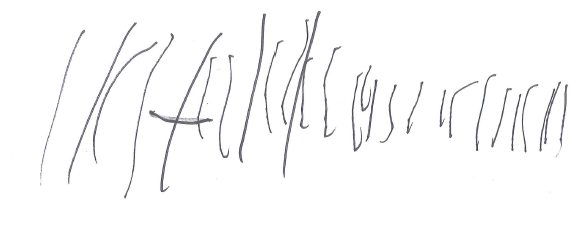
Sound Waves, Gia age 5
Quote: Challenge & Complexity


